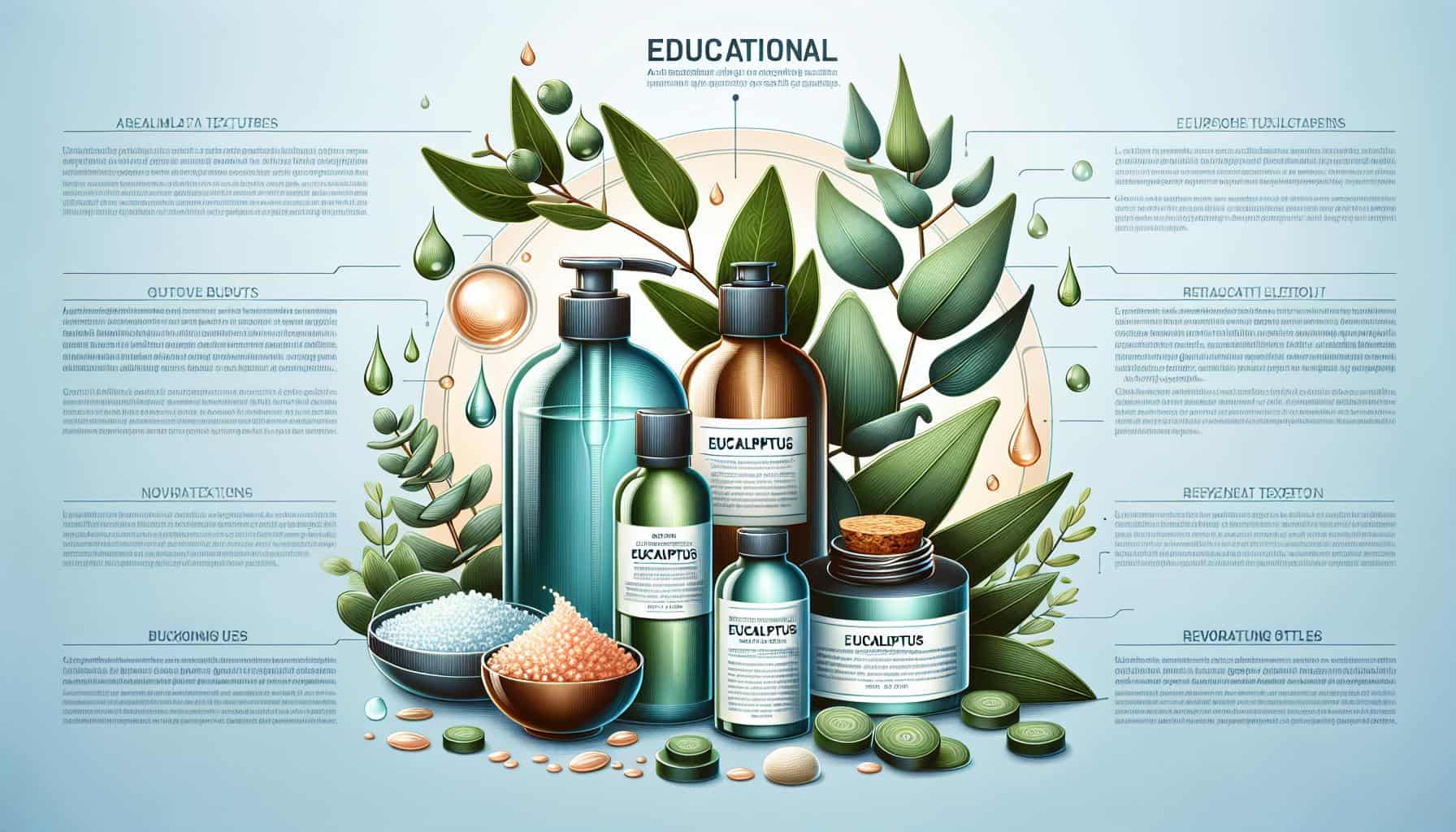Revitalize Your Skin with Eucalyptus Skin Care Essentials
Eucalyptus oil, a popular essential oil found in various fragrances and skincare products, is celebrated for its remarkable anti-inflammatory, antioxidant, and hydrating properties. It’s not just a refreshing scent; it’s a powerhouse of benefits that can rejuvenate your skin.
However, eucalyptus oil is potent and must be used with care. While it’s a staple in many skin care routines, it’s not suitable for every skin type. Understanding how to use it safely can help you avoid irritation and reap its full benefits.
Before you dive into adding eucalyptus oil to your regimen, it’s crucial to know how to use it properly. Let’s explore the safe application, benefits, and reasons why eucalyptus oil might be the refreshing twist your skin care routine needs.
The Power of Eucalyptus Oil in Skincare
Tapping into the potential of eucalyptus oil for your skin care routine might just be the game-changer you’ve been looking for. Eucalyptus oil carries remarkable properties that are transformative for the skin. Its cleansing power not only removes dirt and impurities from pores but also targets the very elements that can lead to skin problems.
With its ability to soothe inflammation and reduce itching, eucalyptus oil is ideal for addressing symptoms associated with chronic skin conditions. Once your skin’s been cleared of irritants, this potent oil goes the extra mile. It creates a protective barrier, safeguarding your skin from a multitude of environmental threats that can accelerate aging, including:
- Cigarette smoke
- Exhaust fumes
- UV rays
- Toxins
These pollutants are notorious for causing skin damage which, without protection, can lead to the appearance of premature aging. By incorporating eucalyptus skin care into your regimen, you’re not just cleansing, you’re actively defending your skin’s future.
Aside from its defensive capabilities, eucalyptus essential oil is recognized for its purifying properties. Households everywhere are coming to appreciate the role it plays in shampoos, disinfectants, and even sunscreens. The oil is extracted chiefly through distillation but can also be cold-pressed, a method that preserves its skin-soothing benefits along with its naturally calming scent.
Eucalyptus globulus, the tree from which the oil is derived, is a towering symbol of resilience and fortitude, reaching heights of up to 200 feet. It’s no surprise that the oil mirrored from this mighty plant exhibits such potent protective qualities.
Remember, while eucalyptus oil is a powerful ingredient, it’s important that you use it with care. Never apply it directly; always choose products where eucalyptus is one of the ingredients specially formulated for safe topical usage. By doing so, you’ll enjoy all the benefits it offers without the risk of skin irritation.
Understanding the Benefits of Eucalyptus Oil for the Skin
 When delving into eucalyptus skin care, you’ll often encounter claims about its antibacterial and anti-inflammatory properties, but what does that mean for your skin? These qualities suggest that eucalyptus oil can help in reducing the presence of bacteria that may lead to acne and other skin conditions. With its purifying effects, it’s not just about addressing current skin concerns; it also aids in preventing future issues.
When delving into eucalyptus skin care, you’ll often encounter claims about its antibacterial and anti-inflammatory properties, but what does that mean for your skin? These qualities suggest that eucalyptus oil can help in reducing the presence of bacteria that may lead to acne and other skin conditions. With its purifying effects, it’s not just about addressing current skin concerns; it also aids in preventing future issues.
The anti-inflammatory aspect of eucalyptus oil is particularly noteworthy. Inflamed skin can manifest as anything from a mild rash to more severe conditions like dermatitis. Eucalyptus oil’s soothing properties can help calm the skin, reducing redness and irritation. However, it’s important to note that sensitive skin may react differently, and a patch test is always advised before full application.
While the focus is often on the possible skin-clearing benefits, eucalyptus oil’s role in skincare goes beyond combating bacteria. It contributes to the skin’s hydration, acting as a moisturizing agent. This can be especially beneficial in products aimed at dry skin, where maintaining moisture balance is key.
Given its unique properties, eucalyptus oil is found in a variety of household products, from cleansers to lotions. Your selection of these products should be guided by the reputation of brands that prioritize safe formulations. Always choose products specifically designed for skin application and avoid ingesting eucalyptus oil due to its potential toxicity.
Remember, while embracing the positives of eucalyptus skin care, it’s crucial to consult with a dermatologist, particularly if you have existing skin conditions. The protective barrier eucalyptus oil provides could fortify your skin against environmental threats, possibly slowing down the signs of aging.
Your skin is as unique as you are, and incorporating natural elements like eucalyptus oil should be done with care and consideration to ensure you receive the benefits without the risks.
Is Eucalyptus Oil Suitable for Your Skin Type?
Incorporating eucalyptus oil into your skin care routine can be a game changer, especially if you’re battling with dryness or damage. Unlike its plant-based oil counterparts, eucalyptus oil is unique due to its lack of fatty acids. This means it’s not a true oil but rather a thin, spreadable substance with potent antioxidant and anti-inflammatory properties. Its ability to hydrate without the heaviness makes it a versatile option for many.
However, understanding your skin type is crucial when considering eucalyptus skin care. If you’re keen on exploring eucalyptus oil for your skin, here’s a bit of what you need to know:
- Dry or Damaged Skin: Eucalyptus oil is a boon due to its moisturizing properties. It can be particularly soothing for skin that needs rejuvenation.
- Sensitive Skin: Patch testing is always advised since, while unlikely, there could be potential for irritation.
- Acne-Prone Skin: Caution should be exercised as eucalyptus oil might not be the best fit for you. Despite its benefits, its antibacterial properties may not align well with acneic skin conditions.
Fortunately, eucalyptus is typically compatible with other skincare ingredients, so incorporating it into your regimen should be seamless. To further narrow down whether it’s a match for you, consider exploring resources like the Baumann Skin Type quiz or shop by your specific skin type.
Remember, patch testing on your arm’s skin is an excellent first step before fully integrating new ingredients and products. Each skin type’s reaction to eucalyptus may vary, so listen to what your skin is telling you. Pay attention to any changes, be it positive or neutral, and keep an eye out for any signs of irritation.
Safe Application of Eucalyptus Oil for Skincare
When you’re looking to include eucalyptus oil in your skincare routine, understanding the right application methods is crucial for maximizing benefits while minimizing risks. Despite its many perks, it’s important to remember that eucalyptus oil should never be ingested and care should be taken to use it properly on the skin.
Before you dive into using eucalyptus-infused products, perform a patch test to check for any allergic reactions. To do this, apply a small amount of the oil or product on a discreet area of your skin and wait for 24 hours. If no irritation occurs, it’s likely safe for you to use.
To ensure safe topical use of eucalyptus oil, always dilute it with a carrier oil such as coconut or jojoba oil. This is especially important as undiluted essential oils can be highly potent and may cause skin irritation or adverse reactions.
Here’s how you can add eucalyptus oil to your skincare regimen:
- Add a few drops to your cleanser or shampoo for an antimicrobial boost.
- Include it in your nightly routine by mixing with your moisturizer for its soothing properties.
- Look for products with eucalyptus that are formulated for eucalyptus skin care specifically.
Be aware that eucalyptus oil does not have a known comedogenicity rating, meaning it’s unclear how likely it is to clog pores. If you have acne-prone skin, you may want to exercise caution or consult a dermatologist before adding eucalyptus oil to your skincare routine.
In line with the EWG score of 4-6, it’s clear that while eucalyptus can be an excellent addition to your skin care arsenal, being mindful of concentration and usage is key to a positive experience. The CIR rates it as an ‘A’ in appropriate concentrations but also underscores the potential for allergic reactions.
Remember, always choose eucalyptus skin care products that are developed with safety in mind. This practice reduces the risk of complications, allowing you to enjoy the regenerative and antimicrobial benefits eucalyptus oil has to offer.
Enhancing Your Skincare Routine with Eucalyptus Oil
 Now that you’ve learned about the benefits of eucalyptus oil for your skin, let’s delve into how you can integrate it into your skincare routine. Eucalyptus skin care is not just about applying an oil; it’s about enhancing the effectiveness of your current regimen.
Now that you’ve learned about the benefits of eucalyptus oil for your skin, let’s delve into how you can integrate it into your skincare routine. Eucalyptus skin care is not just about applying an oil; it’s about enhancing the effectiveness of your current regimen.
If you’re struggling with dry or damaged skin, eucalyptus essential oil may be the missing ingredient. When incorporated correctly, it can significantly improve your skin’s texture and appearance. Remember though, eucalyptus oil should never be applied directly on your skin. It’s potent and must be diluted with a carrier oil or added to a product that’s designed for direct skin application.
Eucalyptus oil’s known for its ceramide-boosting properties. Ceramides are lipids that play a crucial role in maintaining your skin’s barrier and moisture levels. By adding eucalyptus oil to your body lotion or butter, you’re not just moisturizing; you’re also reinforcing your skin’s natural defense mechanisms.
- Perform a patch test
- Dilute eucalyptus oil with carrier oils
- Mix with moisturizers or lotions designed for your skin type
For those aiming to target skin’s firmness and elasticity, leveraging the antibacterial compound macrocarpal A in eucalyptus oil can be a game-changer. This naturally derived ingredient can accelerate the replenishment of ceramides, thereby enhancing the skin’s ability to retain moisture and appear more youthful.
Incorporate eucalyptus oil into your skincare routine to harness these benefits:
- Replenish the skin’s natural barrier
- Reduce the prominence of fine lines and wrinkles
- Protect against environmental pollutants
Adapting your regimen to include eucalyptus oil can lead to not only better-hydrated skin but also create a more resilient and smooth complexion. By understanding the various ways in which eucalyptus oil supports skin health, you can make informed decisions about the products you choose and how you use them.
Conclusion
Embracing eucalyptus oil in your skincare routine could be the game-changer you’re looking for. With its unique ability to cleanse and protect while boosting your skin’s natural defenses, you’re not just indulging in a moment of self-care—you’re investing in your skin’s long-term health. Remember to prioritize safety by selecting products specifically designed for your skin and following the guidelines for use. When used correctly, eucalyptus oil can help you achieve a more radiant and youthful complexion. So why not give your skin the nourishment it deserves and enjoy the refreshing benefits of eucalyptus?
Frequently Asked Questions
Who should not use eucalyptus oil?
Eucalyptus oil should be avoided by children, especially in ingestion, topical application, or inhalation, due to the risk of seizures and other nervous system side effects.
What are the side effects of eucalyptus oil on the face?
The side effects can include skin reactions such as rashes, itching, eczema, and in the case of inhalation, there’s the potential risk of asthma attacks and fever.
Is eucalyptus oil safe for human skin?
Eucalyptus oil is generally safe for adult skin if properly diluted. However, people with certain conditions like asthma, liver or kidney diseases, seizures, or low blood pressure should consult their doctors before use.
Is eucalyptus oil anti-aging?
Yes, eucalyptus oil has demonstrated anti-aging properties, effectively combating free radicals on the skin and potentially reducing the signs of aging.
Does eucalyptus oil promote hair growth?
Eucalyptus oil can reduce hair loss and stimulate hair growth by nourishing the scalp and strands, as well as providing hydration and shine to combat the effects of environmental pollutants.

